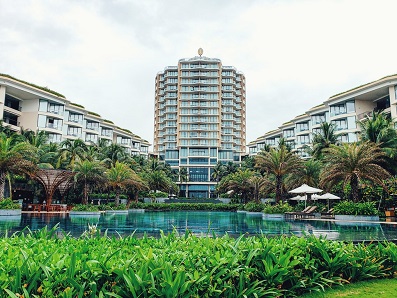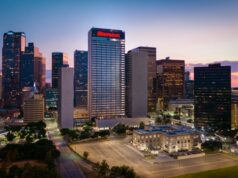 NATIONAL REPORT—While technology continues to disrupt the hotel industry, innovative solutions bring with them efficiencies and significant cost savings, especially with electricity. More hotel owners are adopting sustainable and energy-efficient solutions when it comes to designing their electric systems, everything from solar-powered technology, smart lighting, air-source heat pumps, smart energy management to automatic shutdown sockets.
NATIONAL REPORT—While technology continues to disrupt the hotel industry, innovative solutions bring with them efficiencies and significant cost savings, especially with electricity. More hotel owners are adopting sustainable and energy-efficient solutions when it comes to designing their electric systems, everything from solar-powered technology, smart lighting, air-source heat pumps, smart energy management to automatic shutdown sockets.
There is no better time than now for hotels to embrace intelligent electrical solutions while keeping things simple and uncomplicated for guests to ensure smooth functionality. When planning a hotel electric system, there are several aspects to keep in mind:
Keep It Simple & User-Friendly
If you are wondering how to plan electrical installations for a hotel, you must consider what works best in practice. When planning a hotel electric system, it is best to focus on keeping things uncomplicated and straightforward for hotel guests, especially when it comes to automation. So how do you do this?
Electrical experts recommend that clients answer two critical questions:
- Which functions provide extra comfort and improve the user experience for hotel guests?
- Which functions reduce extra comfort and diminish the user experience for hotel guests?
Answering these questions is key because not every electrical installation that is possible to implement in your plan is necessary. However, you can and should do enough to ensure comfort and a great user experience for guests. The must-have installations when planning a hotel electric system include:
- Hotel systems and locks
- Plug sockets
- Lights
- Switches
These systems have automated options that are more energy-efficient, user-friendly, and convenient, such as energy-saving switches, electric door locks, intelligent room thermostats, and smart lights. When planning an electric system, you must keep the user in mind as a priority and offer cost-effective solutions that benefit both the user and your hotel business.
Focus on Energy-Efficient Solutions
Hotels may use less or more energy for many reasons, including energy management practices, equipment efficiency, business activities, amenities, and climate variations. One vital consideration when planning a hotel electric system is focusing on energy-efficient solutions and upgrades that help your hotel achieve the set energy performance goals. Think of solutions like solar technology for commercial purposes or hotel automation systems with energy consumption monitoring.
Here are some energy-saving tips to keep in mind:
Hotel Lighting
Lighting uses up to 25 percent of all electricity consumed in hotels. By installing the most energy-efficient lighting systems, you can save up to 50 percent of that electricity use and cut cooling energy requirements by approximately 10 to 20 percent. Here are ways to ensure maximum energy efficiency in your hotel lighting system:
- Install timers on bathroom heat lamps;
- Install energy-efficient bulbs like LEDs;
- Take advantage of natural daylight as much as possible;
- Consider Energy Star certified CFL and LED bulbs;
- Install occupancy sensors that turn off lights in unoccupied areas;
- Opt for solar lighting for outdoor areas and security lighting; and
- Install intelligent lighting systems where convenient.
Hotel Heating & Cooling
Heating and cooling in hotels consume up to 40 percent of the electricity used and more than half of the natural gas used. Most hotels continue to heat and cool rooms regardless of whether they are occupied or not, leading to massive energy waste. This is despite reports showing that hotel rooms are primarily unoccupied for 12 hours every day on average.
Here is how you can save energy with heating and cooling:
- Link the energy management system, automated check-out system, and reservation system together to control heating and cooling;
- Ensure the entire property is energy-proof with no leaks;
- Change air filters regularly, especially during winter and summer;
- Install smart thermostats in guestrooms;
- Close entire wings, floors, and reduce lighting and HVAC systems during low occupancy periods; and
- Assign guests to adjoining rooms for better insulation.
Hotel Maintenance, Housekeeping, & Management
Housekeeping, regular maintenance work, and daily management tasks also use significant energy in hotels. To reduce your energy use, consider these tips:
- Encourage housekeepers to turn off guestroom heating and cooling systems, lights, TVs, and radios when rooms are unoccupied;
- Encourage the use of natural light for housekeeping;
- Close window treatments to reduce heat gain during summer and heat loss during winter;
- Ensure leaking water fixtures are repaired immediately;
- Purchase Energy Star certified products for the hotel; and
- Make use of power management features for equipment like PCs during periods of inactivity.
Take Advantage of Technology to Save Money
With hotels recording random occupancy patterns amid the ongoing COVID-19 pandemic, more hotel owners are taking advantage of innovative technology and smart energy-management systems to save money. No matter the size of a hotel, technology is the way to go when you want to cut costs, especially during challenging times like now and the predicted growing sustainability trends.
Some of the best technologies to keep in mind as you plan your hotel electric system include:
- Smart climate control systems that allow you to program energy consumption around daily occupancy needs;
- Smart sensors that monitor any fluctuations in real-time room occupancy;
- Air source heat pumps that transfer heat from outside the hotel building to the inside—these can be energy-efficient space heaters or coolers;
- Smart lighting systems that allow you to track activity and offer automation for users;
- Solar power technology to run the entire hotel and reduce energy consumption—more hotels are adopting 100 percent solar energy; and
- Automatic shutdown electrical sockets that cut power when not in use; and
- Predictive energy management and monitoring systems that help identify hazardous or wasteful trends, predict maintenance needs, and prevent system downtime.
The Hotel Industry is Going Green
As more hotel owners look to reduce energy costs and embrace sustainable measures, there has been an increase in the number of eco-friendly hotels over the last few years. For new hotel owners, embracing the green future begins with the initial plans, ranging from the hotel’s design to the planning of the electric system. And it is not just about energy savings—it’s more about maintaining environmentally friendly best practices across all hotel operations.
Plan with Technology & Users in Mind
As technology evolves, we’ll continue to see changes in user needs, tastes, and preferences. One thing that does not change is the need for energy consumption. For hotels, there is no shortage of opportunities to embrace technology and reduce energy costs. Depending on factors like location and user preferences, hotel owners can take the right steps when planning the design of the hotel and electric system to achieve their sustainability goals.






